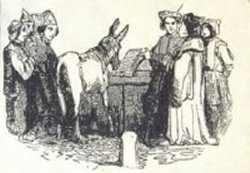Southern Cross Review
Review of
fiction, education, science, current events,
essays, book reviews, poetry
and Anthroposophy
Number 69,
March - April 2010

"Blue Nude" - Henri Matisse (France 1869 - 1954)
|
This 1907 painting, "Nu bleu", was burned in effigy at the Armory Show in Chicago in 1913. We're not worried though: how can you burn something in effigy on the web? Not being familiar with Chicago, where life was cheap and morals dear, Matisse must have been suprised. After all, he was active in the great gathering of artistic talent in Montparnasse (Paris), even though he did not quite fit in with his conservative appearance and strictly bourgeois work habits.  Click on the donkey to browse in the SCR E-book Library
In the "Editor's Page", see what a certain day is like here at the tail end of the world. You can find us under the
Southern Cross constellation in the Traslasierra Valley, Province of
Córdoba, Argentina. Visitors always welcome. Just follow the sign that
reads: La Cruz del Sur.
, Editor
, Associate Editor Check out our
Archives for hundreds of items.
so we can advise when the next issue is ready. It's free of charge. |
|
Contents Editor's Page Fiction Last Day of Last Furlough Acting Medic on Night March Children's Corner Sir Gawain and the Dragon Sir Gawain y el Dragón Current
Events American Blitzkrieg Mitteleuropa - 666 to 1 - The U.S. Miltary, Al-Qaeda and Features The Rise and Fall of the Airlines Pork Beats Viagra Cerdo Mejor que Viagra Science
The Unreasonable Effectiveness of Mathematics in the Natural Sciences Anthroposophy
Mephistopheles and Earthquakes Anthroposophical Guidelines The Anthroposophical Movement - 4 Genesis IX Mythology Phaëthon Poetry Four Quartets |